 By William Rivers Pitt
Originally published in t r u t h o u t | Perspective (truthout.org) The wires have been humming since before the New Year with reports that the Bush administration is planning an attack on Iran. "The Bush administration is preparing its NATO allies for a possible military strike against suspected nuclear sites in Iran in the New Year, according to German media reports, reinforcing similar earlier suggestions in the Turkish media," reported UPI on December 30th. "The Berlin daily Der Tagesspiegel this week," continued UPI, "quoted 'NATO intelligence sources' who claimed that the NATO allies had been informed that the United States is currently investigating all possibilities of bringing the mullah-led regime into line, including military options. This 'all options are open' line has been President George W Bush's publicly stated policy throughout the past 18 months." An examination of the ramifications of such an attack is desperately in order.
1. Blowback in Iraq
Should the United States undertake military action against Iran, the ramifications in Iraq would be immediate and extreme.
In the first eight days of January, eighteen US troops have been killed in Iraq, compounded by another twelve deaths from a Black Hawk helicopter crash on Saturday. Much of the violence aimed at American forces is coming from disgruntled Sunni factions that have their own militias, believe the last elections were a sham, and hold little political power in the government.
If the US attacks Iran, it is probable that American forces - already taxed by attacks from Sunni factions - will also face reprisal attacks in Iraq from Shi'ite factions loyal to Iran. The result will be a dramatic escalation in US and civilian casualties, US forces will be required to bunker themselves further into their bases, and US forces will find themselves required to fight the very government they just finished helping into power. Iraq, already a seething cauldron, will sink further into chaos.
2. Iran's Armaments
Unlike Iraq, Iran has not spent the last fifteen years having its conventional forces worn down by grueling sanctions, repeated attacks, and two American-led wars. While Iran's conventional army is not what it was during the heyday of the Iran-Iraq war - their armaments have deteriorated and the veterans of that last war have retired - the nation enjoys substantial military strength nonetheless.
According to a report issued by the Center for Strategic and International Studies in December of 2004, Iran "has some 540,000 men under arms and over 350,000 reserves. They include 120,000 Iranian Revolutionary Guards trained for land and naval asymmetrical warfare. Iran's military also includes holdings of 1,613 main battle tanks, 21,600 other armored fighting vehicles, 3,200 artillery weapons, 306 combat aircraft, 60 attack helicopters, 3 submarines, 59 surface combatants, and 10 amphibious ships."
"Iran is now the only regional military power that poses a significant conventional military threat to Gulf stability," continued the CSIS report. "Iran has significant capabilities for asymmetric warfare, and poses the additional threat of proliferation. There is considerable evidence that it is developing both a long-range missile force and a range of weapons of mass destruction. It has never properly declared its holdings of chemical weapons, and the status of its biological weapons programs is unknown."
A MILNET brief issued in February 2005 reports, "Due to its position astride the Persian Gulf, Iran has constantly been a threat to the Gulf. The so called 'Tanker' wars in the late 1980s put Iran squarely in the bullseye of all nations seeking to transport oil out of the region. Even the small navy that Iran puts to sea is capable enough to harass shipping, and several cases of small boat operations against oil well heads in the Gulf during that period made it clear small asymmetrical tactics of the Iranian Navy could be quite effective."
"More concerning," continued the MILNET brief, "is the priority placed on expanding and modernizing its Navy. The CSIS report cites numerous areas where Iran has funded modernization including the most troublesome aspect, anti-shipping cruise missiles: 'Iran has obtained new anti-ship missiles and missile patrol craft from China, midget submarines from North Korea, submarines from Russia, and modern mines.'"
It is Iran's missile armaments that pose the greatest concern for American forces in the Gulf, especially for the US Navy. Iran's coast facing the Persian Gulf is a looming wall of mountains that look down upon any naval forces arrayed in those waters. The Gulf itself only has one exit, the Strait of Hormuz, which is also dominated by the mountainous Iranian coastline. In essence, Iran holds the high ground in the Gulf. Missile batteries arrayed in those mountains could raise bloody havoc with any fleet deployed below. 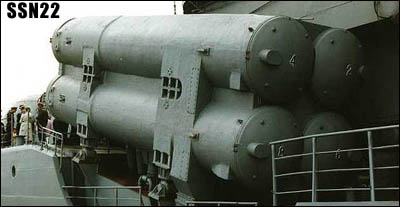 Of all the missiles in Iran's armament, the most dangerous is the Russian-made SS-N-22 Sunburn. These missiles are, simply, the fastest anti-ship weapons on the planet. The Sunburn can reach Mach 3 at high altitude. Its maximum low-altitude speed is Mach 2.2, some three times faster than the American-made Harpoon. The Sunburn takes two short minutes to cover its full range. The missile's manufacturers state that one or two missiles could cripple a destroyer, and five missiles could sink a 20,000 ton ship. The Sunburn is also superior to the Exocet missile. Recall that it was two Exocets that ripped the USS Stark to shreds in 1987, killing 37 sailors. The Stark could not see them to stop them. The US aircraft carrier Theodore Roosevelt is currently deployed in the Persian Gulf, with some 7,000 souls aboard. Sailing with the Roosevelt is the Tarawa Expeditionary Strike Force, which includes the USS Tarawa, the USS Austin, and the USS Pearl Harbor. The USS Austin is likewise deployed in the Gulf. The Sunburn missile, with its incredible speed and ability to avoid radar detection, would do terrible damage these ships if Iran chooses to retaliate in the Gulf after an American attack within its borders. Beyond the naval threat is the possibility of Iran throwing its military muscle into the ongoing struggle in Iraq. Currently, the US is facing an asymmetrical attack from groups wielding small arms, shoulder-fired grenades and roadside bombs. The vaunted American military has suffered 2,210 deaths and tens of thousands of wounded from this form of warfare. The occupation of Iraq has become a guerrilla war, a siege that has lasted more than a thousand days. If Iran decides to throw any or all of its 23,000 armored fighting vehicles, along with any or all of its nearly million-strong army, into the Iraq fray, the situation in the Middle East could become unspeakably dire. 3. The Syrian Connection
Like Iran, Syria's military is nothing to scoff at. Virtually every credible analysis has Syria standing as the strongest military force in the Middle East after Israel. Damascus has been intent for years upon establishing significant military strength to serve as a counterweight to Israel's overwhelming capabilities. As of 2002, Syria had some 215,000 soldiers under arms, 4,700 tanks, and a massive artillery capability. The Syrian Air Force is comprised of ten to eleven fighter/attack squadrons and sixteen fighter squadrons, totaling somewhere near 650 aircraft. Syria also possesses one of the largest arsenals of ballistic missiles in the region, comprised primarily of SCUD-derived systems. Iran, North Korea and China have been willing providers of state-of-the-art technologies. Compounding this is the well-based suspicion that Syria has perhaps the most advanced chemical weapons capability in the Persian Gulf. 4. China and the US Economy While the ominous possibilities of heightened Iraqi chaos, missiles in the Gulf, and Syrian involvement loom large if the US attacks Iran, all pale in comparison to the involvement of China in any US/Iran engagement. China's economy is exploding, hampered only by their great thirst for petroleum and natural gas to fuel their industry. In the last several months, China has inked deals with Iran for $70 billion dollars worth of Iranian oil and natural gas. China will purchase 250 million tons of liquefied natural gas from Iran over the next 30 years, will develop the massive Yadavaran oil field in Iran, and will receive 150,000 barrels of oil per day from that field. China is seeking the construction of a pipeline from Iran to the Caspian Sea, where it would link with another planned pipeline running from Kazakhstan to China. Any US attack on Iran could be perceived by China as a direct threat to its economic health. Further, any fighting in the Persian Gulf would imperil the tankers running China's liquefied natural gas through the Strait of Hormuz. Should China decide to retaliate against the US to defend its oil and natural gas deal with Iran, the US would be faced with a significant threat. This threat exists not merely on a military level, though China could force a confrontation in the Pacific by way of Taiwan. More significantly, China holds a large portion of the American economy in the palm of its hand.
"The hardest blow on Americans," concluded Roberts, "will fall when China does revalue its currency. When China's currency ceases to be undervalued, American shoppers in Wal-Mart, where 70 percent of the goods on the shelves are made in China, will think they are in Neiman Marcus. Price increases will cause a dramatic reduction in American real incomes. If this coincides with rising interest rates and a setback in the housing market, American consumers will experience the hardest times since the Great Depression." In short, China has the American economy by the throat. Should they decide to squeeze, we will all feel it. China's strong hand in this even extends to the diplomatic realm; China is a permanent member of the United Nations Security Council, and could veto any actions against Iran proposed by the United States. 5. American Preparedness
Two vaunted economists -- one a Nobel Prize winner and the other a nationally renowned budget expert - have analyzed the data at hand and put a price tag on the Iraq occupation. According to Linda Bilmes of Harvard and Nobel Laureate Joseph E. Stiglitz of Columbia University, the final cost of the Iraq occupation will run between $1 trillion and $2 trillion, surpassing by orders of magnitude the estimates put forth by the Bush administration. If an engagement with Iran envelops our forces in Iraq, and comes to involve Syria, our economy will likely shatter under the strain of fighting so many countries simultaneously. Add to this the economic threat posed by China, and the economic threat implicit in any substantial disruption of the distribution of Mideast petroleum to the globe. If Iran and Syria -- with their significant armaments, missile technologies and suspected chemical weapons capabilities - decide to engage with the relatively undersized US force in Iraq, our troops there will be fish in a barrel. Iran's position over the Gulf would make resupply by ship and air support from carriers a dangerous affair. In the worst-case scenario, the newly-minted American order of battle requiring the use of nuclear weapons to rescue a surrounded and imperiled force could come into play, hurling the entire planet into military and diplomatic bedlam. Conclusion: Is Any of This Possible? The question must be put as directly as possible: what manner of maniac would undertake a path so fraught with peril and potential economic catastrophe? It is difficult to imagine a justification for any action that could envelop the United States in a military and economic conflict with Iraq, Iran, Syria and China simultaneously. Iran is suspected by many nations of working towards the development of nuclear weapons, but even this justification has been tossed into a cocked hat. Recently, Russian president Vladimir Putin bluntly stated that Iran is not developing its nuclear capability for any reasons beyond peaceful energy creation, and pledged to continue assisting Iran in this endeavor. Therefore, any attack upon Iran's nuclear facilities will bring Russia into the mess. Iran also stands accused of aiding terrorism across the globe. The dangers implicit in any attack upon that nation, however, seem to significantly offset whatever gains could be made in the so-called "War on Terror." Unfortunately, all the dangers in the world are no match for the self-assurance of a bubble-encased zealot. What manner of maniac would undertake such a dangerous course? Look no further than 1600 Pennsylvania Avenue. George W. Bush and his administration have consistently undertaken incredibly dangerous courses of action in order to garner political power on the home front. Recall the multiple terror threats lobbed out by the administration whenever damaging political news appeared in the media. More significantly, recall Iraq. Karl Rove, Bush's most senior advisor, notoriously told Republicans on the ballot during the 2002 midterms to "run on the war." The invasion of Iraq provided marvelous political cover for the GOP not only during those midterms, but during the 2004 Presidential election. What kind of political cover would be gained from an attack on Iran, and from the diversion of attention to that attack? The answer lies in one now-familiar name: Jack Abramoff. The Abramoff scandal threatens to subsume all the hard-fought GOP gains in Congress, and the 2006 midterms are less than a year away. Is any of this a probability? Logic says no, but logic seldom plays any part in modern American politics. All arguments that the Bush administration would be insane to attack Iran and risk a global conflagration for the sake of political cover run into one unavoidable truth. They did it once already in Iraq.
William Rivers Pitt is a New York Times and internationally bestselling author of two books: War on Iraq: What Team Bush Doesn't Want You to Know and The Greatest Sedition Is Silence.
Report: IAF Trained for Iran Attack Sunday 15 January 2006 IAF pilots have completed their mission training and fighter jets have been prepared for an Israeli attack on Iran, the British Sunday Times reported. The article reported that "the elite 69 strategic F-15 I squadron" had been equipped with weapons that will be tested in combat for the first time, and that two missile submarines were on standby: one in the Persian Gulf and the second in Haifa Bay. The Times also said that special IDF forces would be helicoptered into Iran to take out targets that could not be destroyed in an air strike.
Col. [res] Ze'ev Raz, the former IAF pilot who led the Osirak mission, was quoted by the Times as saying, "What we now have is a lot of targets, which makes the operation much more difficult." Raz believes an aerial assault on Iran's nuclear facilities is possible. There are many things that the IAF has done over the past few years that the public is not aware of, and it has made many important advances in mid-air refueling. Israel can strike the Iranian nuclear program, Raz said on Israel's Channel 1 TV's Politika program last week. Former IDF Deputy Chief of Staff Uzi Dayan said last week that if Iran gets nuclear weapons, then so would terror organizations, like Hizbullah. "Israel needs to be ready to act on a military option," Dayan said. "Without getting into details, Israel is capable of doing these things." When Dayan was head of the National Security Agency, he advised the government not to allow a situation in which Israel, and the world now finds itself, with a radical regime in Tehran on the verge of attaining nuclear weapons. Dayan laid much of the blame on the United States, which allowed this to happen. "The military option does exist, but only if the international community works together. The government that arises in Israel after the elections will have to deal with this issue," he said. Shabtai Shoval, a former operative in the Israeli intelligence community, who wrote a book that Iran will reach nuclear weapons capability by 2009, says that covert action, for example by the Mossad, is the most interesting option, but would still not stop Tehran's push for nuclear weapons. Dr. Reuven Pedatzur, a senior lecturer at the Strategic Studies Program at Tel Aviv University, believes Israel would be making a "disastrous strategic error" if it embarked on a full-scale attack on Iran's nuclear facilities. "The military option is not relevant, we simply don't have the right amount of intelligence and information; many of the targets are buried deep under ground. Only if the Americans decide to do it, then that option is possible," Pedatzur said last week. Pedatzur added that the day Iran gets a nuclear weapon, Israel will have no choice but to abandon its policy of nuclear ambiguity. Goss Tells Turks to Prepare for Iran Attack
Retired colonel claims U.S. military operations are already 'underway' in Iran
Ron Brynaert
During an interview on CNN Friday night, retired U.S. Air Force Colonel Sam Gardiner claimed that U.S. military operations are already 'underway' inside Iran, RAW STORY has found.
"I would say -- and this may shock some -- I think the decision has been made and military operations are under way," Col. Gardiner told CNN International anchor Jim Clancy (as noted by Digby at the blog Hullabaloo).
Gardiner, who designed a war game in November of 2004 for Atlantic Magazine ("Will Iran be next?") which simulated "preparations for a U.S. assault on Iran," also claimed that Aliasghar Soltaniyeh, the Iranian ambassador to the United Nation's International Atomic Energy Agency (IAEA), told him a few weeks ago that units who had attacked the Revolutionary Guard had been captured and confessed to working with Americans.
"The secretary point is, the Iranians have been saying American military troops are in there, have been saying it for almost a year," Gardiner said. "I was in Berlin two weeks ago, sat next to the ambassador, the Iranian ambassador to the IAEA. And I said, 'Hey, I hear you're accusing Americans of being in there operating with some of the units that have shot up revolution guard units.'"
"He said, quite frankly, 'Yes, we know they are. We've captured some of the units, and they've confessed to working with the Americans,'" said the retired Air Force colonel.
Last Thursday, Raw Story's Larisa Alexandrovna reported (On Cheney, Rumsfeld order, US outsourcing special ops, intelligence to Iraq terror group, intelligence officials say) that, according to former and current intelligence officials, the Pentagon has been using a right-wing terrorist organization known as Mujahedeen-e Khalq (MEK) as an operational asset "to create strife in Iran in preparation for any possible attack."
"[I]nstead of securing a known terrorist organization, which has been responsible for acts of terror against Iranian targets and individuals all over the world ≠ including US civilian and military casualties ≠ Rumsfeld under instructions from Cheney, began using the group on special ops missions into Iran to pave the way for a potential Iran strike," Larisa reported.
"They are doing whatever they want, no oversight at all,≤ an intelligence source told Larisa.
Larisa reported that the MEK soldiers were told to "quit" their organization and were "renamed" in accordance with a plan conceived by Secretary of Defense Donald Rumsfeld so that they could be "converted" into a military special ops team.
According to a UN official close to the Security Council whom Larisa interviewed, the "newly renamed MEK soldiers" were being employed in the place of U.S. military advance teams to commit "acts of violence in hopes of staging an insurgency of the Iranian Sunni population."
≥We are already at war,≤ the UN official told RAW STORY.
May 21, 06
Olmert: Iran Close to Atomic Bomb Know-How
By RAMIT PLUSHNICK-MASTI,
Iran is just a few months away from acquiring the technological know-how that will allow it to build an atomic bomb, Israeli Prime Minister Ehud Olmert said in an interview broadcast Sunday.
Olmert flew to Washington on Sunday for his first meeting as prime minister with President Bush. The two leaders are expected to discuss Iran's nuclear ambitions.
Olmert told CNN's "Late Edition" that the key issue regarding Iran was not when it builds a nuclear bomb, but rather when it acquires the knowledge they need to manufacture such arms.
"This technological threshold is nearer than we anticipated before. This is because they are already engaged very seriously in enrichment," Olmert said.
"The technological threshold is very close. It can be measured in months rather than years," Olmert added, repeating statements previously made by other senior Israeli officials.
Olmert said the world could not take Iran's nuclear ambitions lightly because Iranian President Mahmoud Ahmadinejad has repeatedly called for Israel's destruction. However, he said it was unlikely Israel would act on its own, diplomatically or militarily, to deal with the problem.
In 1981, Israel's air force attacked the Iraqi nuclear reactor at Osirak, destroying the facility. But Olmert said the situations cannot be compared, and Israel will try to persuade the Western world to impose sanctions on Iran.
Iran has so far rejected European proposals to back off the idea of U.N.-imposed sanctions if Tehran agrees to freeze its uranium enrichment program. Another proposal the Europeans are preparing will apparently include a clause saying that if Iran refuses, it could face sanctions backed by the threat of force.
Iran, which insists its nuclear program is for peaceful, civilian purposes, says it has the right to enrich uranium.
Olmert expressed confidence that Bush would "lead other nations in taking the necessary measures to stop Iran from becoming a nuclear power."
"We will certainly try to convince other countries that, at this time, before they cross the technological threshold, that the measures will be taken to stop them," Olmert said.
|
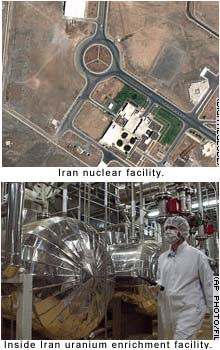 The recent elections in Iraq were dominated by an amalgam of religiously fundamentalist Shi'ite organizations, principally the Dawa Party and the Supreme Council for Islamic Revolution in Iraq (SCIRI). Both Dawa and SCIRI have umbilical connections to the fundamentalist Shi'ite leadership in Iran that go back decades. In essence, Iran now owns a significant portion of the Iraqi government.
The recent elections in Iraq were dominated by an amalgam of religiously fundamentalist Shi'ite organizations, principally the Dawa Party and the Supreme Council for Islamic Revolution in Iraq (SCIRI). Both Dawa and SCIRI have umbilical connections to the fundamentalist Shi'ite leadership in Iran that go back decades. In essence, Iran now owns a significant portion of the Iraqi government.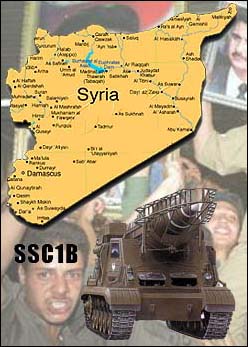 In February of 2005, Iran and Syria agreed upon a mutual protection pact to combat "
In February of 2005, Iran and Syria agreed upon a mutual protection pact to combat " Paul Craig Roberts, writing for The American Conservative, said in July of 2005 that "As a result of many years of persistent trade surpluses with the United States, the Japanese government holds dollar reserves of approximately $1 trillion. China's accumulation of dollars is approximately $600 billion. South Korea holds about $200 billion. These sums give these countries enormous leverage over the United States. By dumping some portion of their reserves, these countries could put the dollar under intense pressure and send U.S. interest rates skyrocketing. Washington would really have to anger Japan and Korea to provoke such action, but in a showdown with China - over Taiwan, for example - China holds the cards. China and Japan, and the world at large, have more dollar reserves than they require. They would have no problem teaching a hegemonic superpower a lesson if the need arose."
Paul Craig Roberts, writing for The American Conservative, said in July of 2005 that "As a result of many years of persistent trade surpluses with the United States, the Japanese government holds dollar reserves of approximately $1 trillion. China's accumulation of dollars is approximately $600 billion. South Korea holds about $200 billion. These sums give these countries enormous leverage over the United States. By dumping some portion of their reserves, these countries could put the dollar under intense pressure and send U.S. interest rates skyrocketing. Washington would really have to anger Japan and Korea to provoke such action, but in a showdown with China - over Taiwan, for example - China holds the cards. China and Japan, and the world at large, have more dollar reserves than they require. They would have no problem teaching a hegemonic superpower a lesson if the need arose."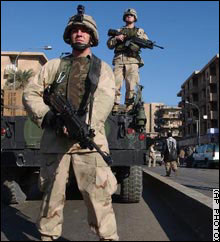 American citizens have for decades taken it as a given that our military can overwhelm and overcome any foe on the battlefield. The rapid victory during the first Gulf War cemented this perception. The last three years of the Iraq occupation, however, have sapped this confidence. Worse, the occupation has done great damage to the strength of the American military, justifying the decrease in confidence. Thanks to repeated deployments to Iraq and Afghanistan, recruiting is at an all-time low. Soldiers with vital training and know-how are refusing to re-enlist. Across the board, the American military is stretched to the breaking point.
American citizens have for decades taken it as a given that our military can overwhelm and overcome any foe on the battlefield. The rapid victory during the first Gulf War cemented this perception. The last three years of the Iraq occupation, however, have sapped this confidence. Worse, the occupation has done great damage to the strength of the American military, justifying the decrease in confidence. Thanks to repeated deployments to Iraq and Afghanistan, recruiting is at an all-time low. Soldiers with vital training and know-how are refusing to re-enlist. Across the board, the American military is stretched to the breaking point.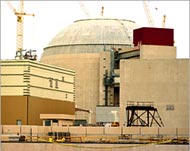 Iran's nuclear facilities, according to the newspaper report, are widely dispersed at some 40 underground sites throughout Iran, which would make any attack by Israel - or any other nation - exponentially more difficult that Israel's successful attack on Iraq's Osirak nuclear reactor in 1981.
Iran's nuclear facilities, according to the newspaper report, are widely dispersed at some 40 underground sites throughout Iran, which would make any attack by Israel - or any other nation - exponentially more difficult that Israel's successful attack on Iraq's Osirak nuclear reactor in 1981.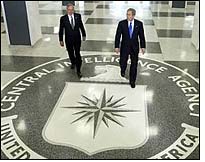 Youíd think the fact Porter Goss, head broom sweeper at the CIA, recently told the Turkish government the United States plans to attack Iran and Syria would be headline splashing news in the New York Times and the Washington Post. But although the news was carried in the Turkish press, it elicited hardly a murmur here in America, with the exception of United Press International and Reuters. As for the latter, only Gossí meeting with Turkish officials on the ìseparatist terrorist organizationî known as the Kurdistan Workers Party was mentioned and nothing about the impending attack, while the UPI mentioned it in the fourth paragraph, stating: ìGoss said that Iran sees Turkey as an enemy and will ëexport its regime,í warning Ankara to be ready for a possible U.S. aerial operation against Iran and Syria.î
Youíd think the fact Porter Goss, head broom sweeper at the CIA, recently told the Turkish government the United States plans to attack Iran and Syria would be headline splashing news in the New York Times and the Washington Post. But although the news was carried in the Turkish press, it elicited hardly a murmur here in America, with the exception of United Press International and Reuters. As for the latter, only Gossí meeting with Turkish officials on the ìseparatist terrorist organizationî known as the Kurdistan Workers Party was mentioned and nothing about the impending attack, while the UPI mentioned it in the fourth paragraph, stating: ìGoss said that Iran sees Turkey as an enemy and will ëexport its regime,í warning Ankara to be ready for a possible U.S. aerial operation against Iran and Syria.î